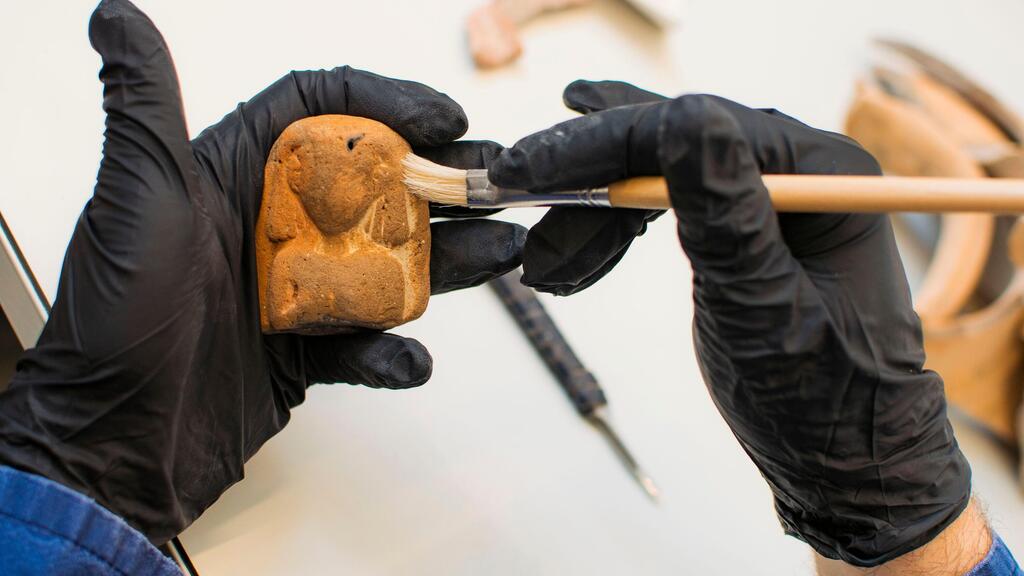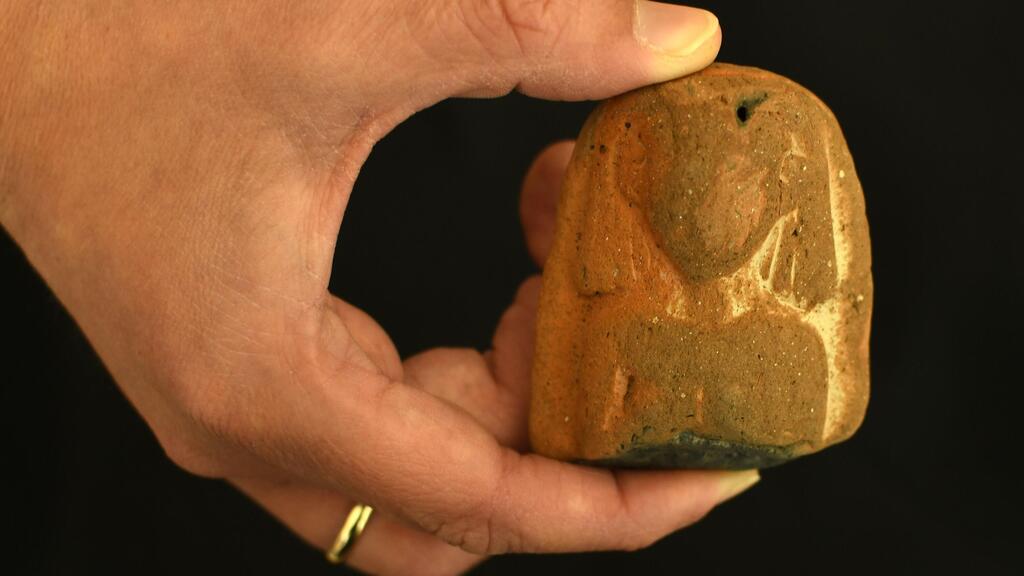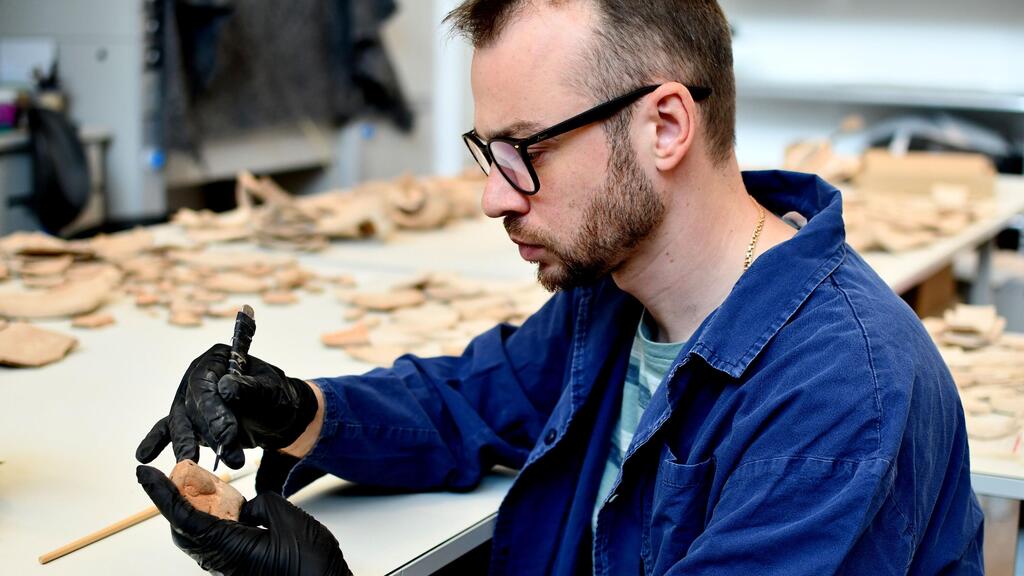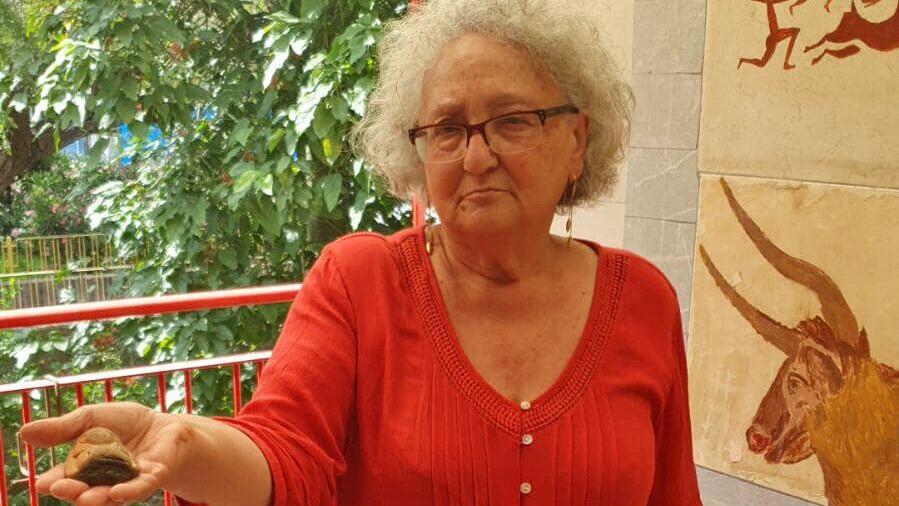Getting your Trinity Audio player ready...
A sculpture over 3,000 years old, identified with the Egyptian goddess Hathor, was discovered by an elderly woman amid her typical walk in Palmachim Beach National Park. The figurine was transferred to the custody of the National Treasures Department of the Israel Antiquities Authority.
Read more:
Lydia Marner, a 74-year-old resident of Lod, immigrated to Israel from Azerbaijan with her husband and two daughters. For many years, she worked as a mediator in welfare, and since retiring, she and her husband regularly go on weekly trips to the Palmachim Beach National Park.
"The beach is one of our favorite spots in the country. Almost every week, we go there on family trips, sometimes we even go in the water, and the place holds great family value for us," she said.
A few weeks ago, while walking along the beach, she noticed something washed ashore. "It was a rather stormy day, the waves were high. During the walk near the water, I noticed a stone coming towards me.
"I called my husband immediately and told him - this is not just an ordinary stone, I felt there was something beyond a regular rock here.'" Lydia photographed the stone and immediately consulted her acquaintances who are knowledgeable in the subject. They advised her to have the stone examined by professionals. She turned to the Antiquities Authority via Facebook, and representatives from the authority arrived to collect the special statuette together with her.
4 View gallery


The figurine of Egyptian goddess Hathor
(Photo: Yuli Schwartz, Israel Antiquities Authority)
After examination, it was determined that it is a historic figurine. A figurine is a small statuette depicting a human or animal form, sculpted primarily from clay, stone, and metal. Through studying them, one can learn about the rituals, lifestyles, and customs of different cultures throughout history. The figurine found by Lydia was identified with the Egyptian goddess Hathor, and is typical to the Canaanite culture, particularly to the Late Bronze Age, from around 1500 to 1000 BCE.
Lydia has always had a passion for exploring and learning about the history and archaeology of her surroundings. She mentioned that she had become acquainted with a nature guide who became a close friend, and she strives to learn more and more about different periods in history through the knowledge he shares with her. Even now, several weeks after the discovery, Lydia is excited about her finding.
"I can't believe I was fortunate enough to experience this. At first, my husband laughed at me, but now the whole family knows my amazing story. I am very happy that the privilege of finding this fell on my part," she said.
4 View gallery


The figurine of Egyptian goddess Hathor
(Photo: Yuli Schwartz, Israel Antiquities Authority)
According to Dr. Amir Golani, an expert in the Bronze Age at the Antiquities Authority, "These figurines, which served as worship objects and are identified with the Egyptian goddess Hathor, are typical to the Canaanite culture, especially during the Late Bronze Age.
"The Canaanites adopted the ritual and religious practices of the Egyptians, who dominated our region during that period. Similar to how houses today install a mezuzah or hang a picture of Baba Sali on the wall, they used to place figurines in a prominent place in the house for good luck and protection. Hathor, identified by her hairdo, was a powerful goddess that symbolized fertility, strength, protection, and wisdom for the Egyptians."
4 View gallery


The figurine of Egyptian goddess Hathor being cleaned
(Photo: Yuli Schwartz, Israel Antiquities Authority)
Last week, the Antiquities Authority and the Ministry of Heritage launched a campaign calling on people who have antiquities in their homes to hand them over to the National Treasures Department. "The campaign to return antiquities, led by the Ministry of Heritage and the Antiquities Authority, is important and significant," said Heritage Minister Amihai Eliyahu.
"The retrieved antiquities will assist in reconstructing the historical narrative of the Land of Israel. I call upon the general public who possesses any kind of antiquities to return them to the Antiquities Authority, which will hold them under appropriate preservation conditions. Some of the antiquities will be presented to the public in various exhibitions in museums."
12 THOUSAND YEAR OLD MINIATURE INSTRUMENT FOUND IN HULA VALLEY
(ILTV)





